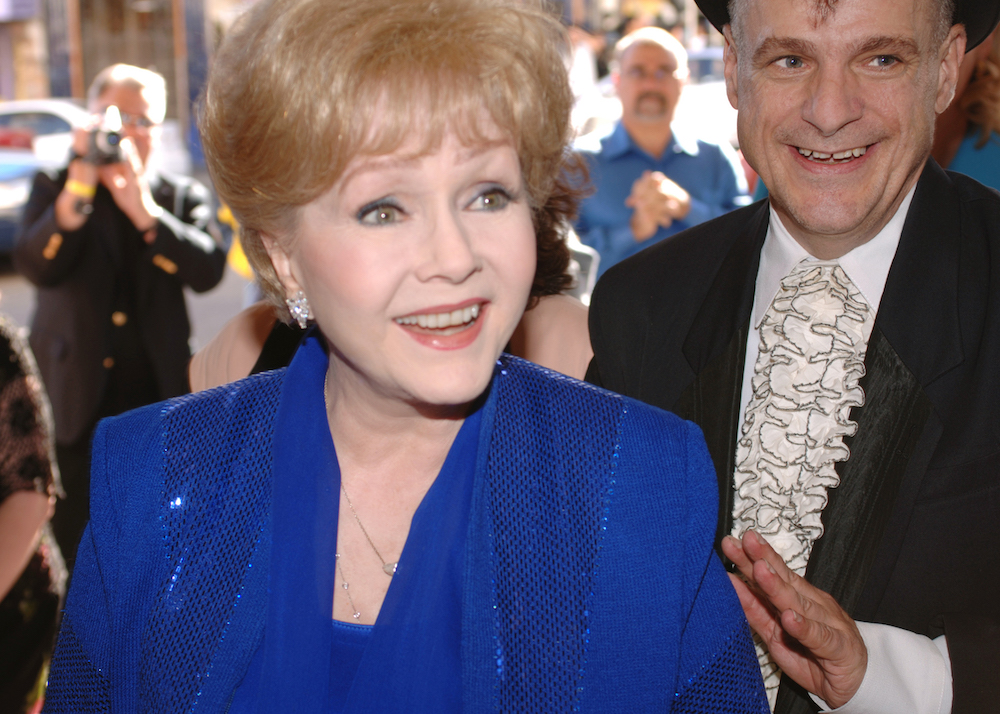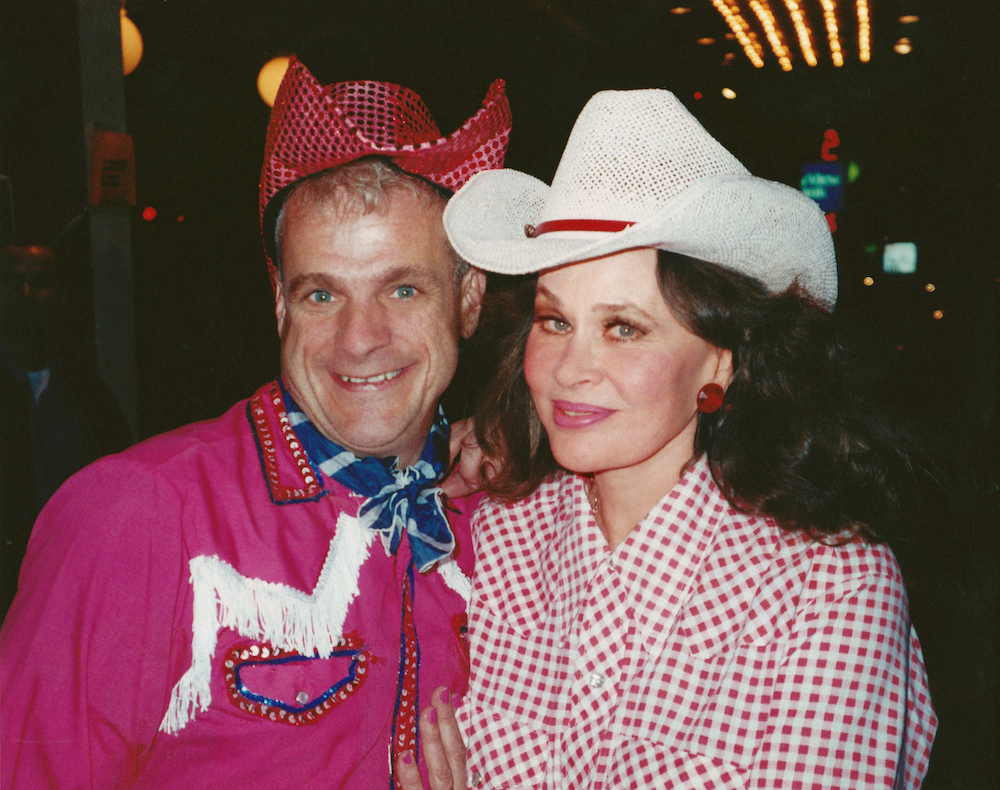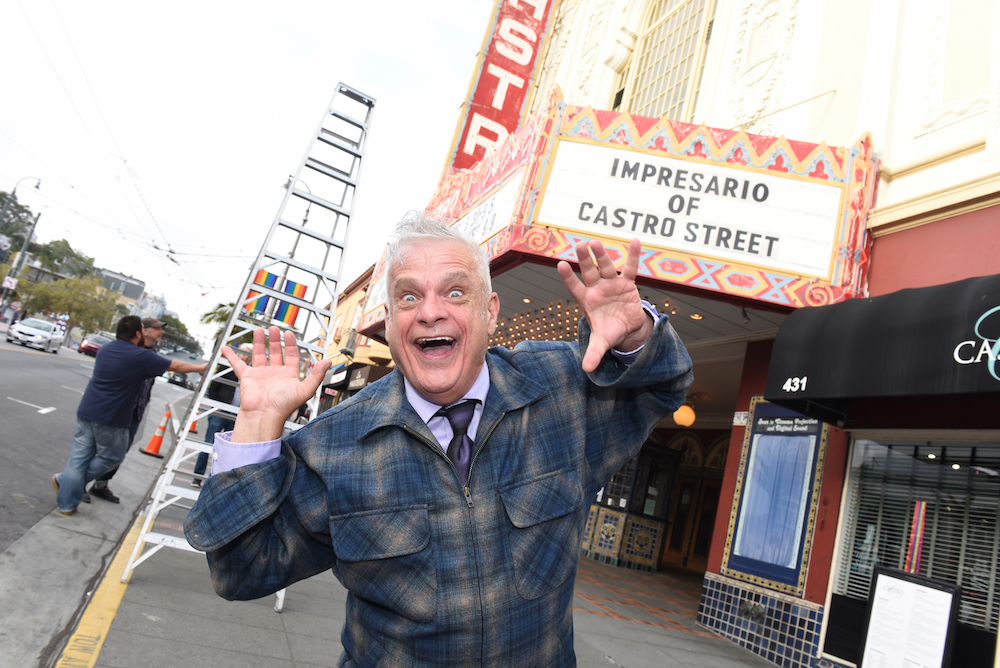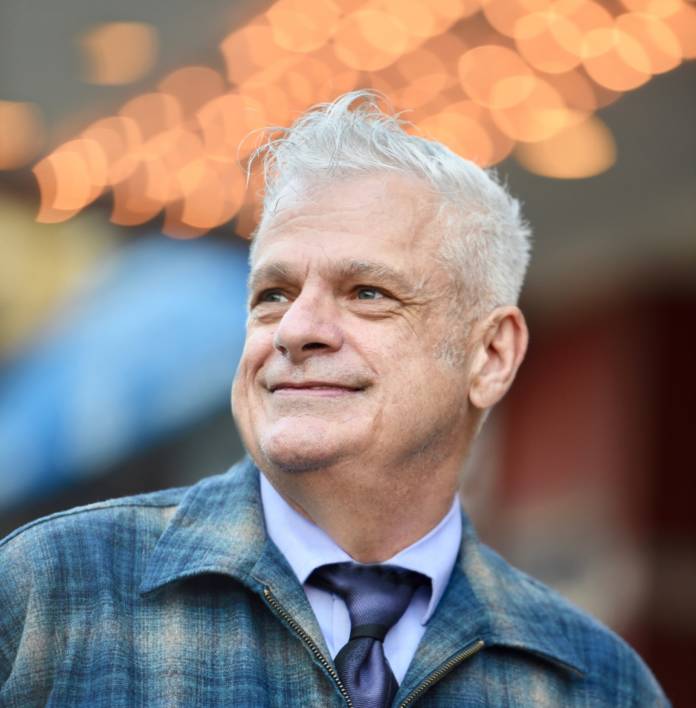Legendary event producer Marc Huestis is famous for organizing lavish tributes to Hollywood stars including Debbie Reynolds, Ann Miller, Jane Russell, Karen Black, Patty Duke, and John Waters, at the Castro Theatre.
But Sun/23, Huestis, who has just released his autobiography, Impresario of Castro Street (Kindle, $9.99; Deluxe Color Print Edition, $29.99; Black and White Edition, $19.99)—which details all the blood, sweat, and tinsel that went into this labor of love, and his own life—is going to get some much-deserved love in return from the community that he’s supported artistically for the past 45 years. In typical Marc Huestis fashion, he’s coordinating it, himself.
“No one else’s gonna do it,” he joked. “I feel like on one hand, it’s self-indulgent, but it’s the kind of tribute I wanted to give myself and now I’m creating this show that’s all about me and in my own words. A good circle of friends who’ve been with me over a long period of time are going to be there and I think it’s going to be very special for me.“
Huestis is an artist in his own right. Decades ago he performed with fabled theatre group the Angels of Light, co-founded the Frameline film festival, and produced the 1982 camp classic film Whatever Happened to Susan Jane? as well as some of the earliest AIDS docs including 1987’s Chuck Solomon: Coming of Age and the award-winning Sex Is… This special ‘Marc Huestis: Impresario of Castro Street tribute event (Victoria Theatre, June 23, 6:45pm), part of the Frameline Film Fest, is long overdue.
Part of the Frameline film festival, which Huestis helped launch in the mid-’70s, the showcase will include readings and performances of the filmmaker and event producer’s memoir by Poseidon Adventure star Carol Lynley, comic Bruce Vilanch, film critic Jan Wahl, and photographer Dan Nicoletta, as well as archival footage from his ’70s stage appearances and clips from his films, Castro tributes, and Lauretta Molitor’s upcoming documentary Impresario.
Huestis spoke to me about why it was finally time to write a book, his encounters with Harvey Milk and Robin Williams, how he survived the early AIDS crisis, overcoming meth addiction, and what his more low-key life is like today in his cabin in the woods.
48 HILLS Why did you decide to write a memoir?
MARC HUESTIS I just wanted a legacy. My friend Lawrence Helman and I have this joke that if you want a good obituary, you’ve gotta write it yourself. And it’s true, I’ve seen a lot of my friends die and their obituaries are not representative of who they are. So I thought I’d write my own obituary while I’m still alive.
Help us save local journalism!
Every tax-deductible donation helps us grow to cover the issues that mean the most to our community. Become a 48 Hills Hero and support the only daily progressive news source in the Bay Area.
48 HILLS Your coming of age in the ‘60s, which you describe in depth in the book, was so different than that experienced by young gay boys today. Talk to me about the difference.
MARC HUESTIS It was like forbidden fruit, and in a way, it was more exciting because it was verboten. I’m thrilled it’s not that way anymore, and I keep thinking if I had grown up in a very different time, maybe I would get married. But in our day and age, the thought of marriage was completely foreign to us and the way we met was through sex. I kinda liked that. I met a lot of really nice people through sex.
48 HILLS You’ve also met so many legends over the years—way too many to mention in our interview —but I want to talk about two of them. Let’s start with Harvey Milk.
MARC HUESTIS The [pervading] Harvey Milk story is the biggest cliche right now, and everybody asks, “What would Harvey do if he were here?” Nobody even knew who he was, and who knows what he would have been like had he lived? But people created this really boring saint around a real-life person. So part of the reason for the book was to break those cliches and talk about what was really going on the way I saw it.
48 HILLS In one memorable section, you describe arguing with him about the tactic the gay community should take at Pride. He insisted on a very button-down approach and you wanted the community to be themselves—drag queens, leather daddies, power dykes, and all. It had to be intimidating to go toe to toe with Saint Harvey, right?
MARC HUESTIS Absolutely not. I was going toe to toe with somebody whom I considered an equal. I was certainly younger than him and didn’t own a camera shop, but I was also really involved with the arts and didn’t see him as somebody above me. He was very condescending, and he saw me as somebody below him, for sure. He saw himself punching down, but I didn’t see myself punching up at all.

48 HILLS Then some years later, when you worked at a local video store, you’d regularly encounter Robin Williams. What was your impression of him?
MARC HUESTIS He had the worst taste in movies. He would rent the cheesiest, stupidest Hollywood new releases. Like are you actually going to watch this? But he was very sweet. He, of course, was concerned about AIDS as well, and he watched my Chuck Solomon film after I gave him a copy.
But he did appear depressed all the time. There wasn’t a lot of lightness around him. But he was a gentleman and had an aura of integrity. When he committed suicide, I really felt for him, but it made sense to me. I saw that person that killed himself in the video store.
48 HILLS You write about losing so many dear friends and colleagues in the early years of AIDS and becoming positive, yourself. What got you through that intensely difficult period?
MARC HUESTIS It took making the Chuck Solomon movie, basically. It made me feel alive again and gave me purpose and strength. The fact that it was able to get international recognition and that people outside my community saw it and just going on the road and talking about being HIV positive at a time when very few people did that because you could lose your job, family, and friends. But that became my purpose, mission, and goal and I was thrilled to do it.
And then after the Chuck Solomon piece, I was dedicated to doing AIDS work. Even that stupid Hawaii movie that I did [1990’s Men in Love] was AIDS-related and of course, Sex Is… was not specifically an AIDS film but was one because it was a time that people were coming back into their sexuality, realizing that “Sex is Death” did not have to be so.

48 HILLS With the prevalence of “Meth Equals Death” campaigns since the early 2000s, I’d imagine that many younger gay men, in particular, have been fearful of exploring sex on crystal, and if they have dabbled, they’re not telling. But in the book, you’re very open about your dalliances before you finally quit both. I appreciate your honesty.
MARC HUESTIS My book is honest. I talk about how speed is the best drug for sex and it is the devil’s drug. But not a lot of people talk about why it was so attractive. I enjoyed it every three months and always looked forward to the next time, except that you can’t get a hard-on and can’t cum.
Still, the mind is an incredible thing when you’re on that drug. You don’t even have to talk. You just feel an aura and all this closeness. I loved all those semi-homeless tricks of mine. That’s what the drug did. People talk about how horrible it was, but I wanted to write about the attractive nature of it, because if you don’t write about that, then it doesn’t make sense why people were so into it at that time.
48 HILLS As someone who was once very sexually active and now categorizes themselves as being celibate, how do you go without all that intimacy today?
MARC HUESTIS First of all, when I was having sex, it wasn’t all that intimate. It was kind of an addiction and I never got much enjoyment out of it. There were momentary enjoyments, but I was always searching and never finding. You never knew what you had because someone better was always around the corner. And it was a lot of work.
And as I write in the book, you get older and they come to your door and they say, “I don’t think it’s gonna work,” and you say, “Whatever.” And you get to the point that you don’t want that rejection anymore. I certainly do masturbate—I’m not totally unsexual—and I have my attractions when I see people, but I love not having sex.

48 HILLS You’ve also had to go without producing shows at the Castro Theatre for the last few years. When you walk by the theatre today and don’t see your name on the marquis, does that feel like yet another loss?
MARC HUESTIS I feel very profoundly like I am no longer there. For the upcoming show, I’m putting together these clips and I do this one montage of the entrances of the stars and a couple of really fun moments, and I was like, “These shows were really fun.” You don’t realize when you’re doing it, because it happens and then it’s over. And particularly at the end, I felt so belittled, because everyone was saying how tired they were. But you always need to know when to step off the stage.
48 HILLS Today you divide your time between your cabin in the woods and San Francisco. What inspired the decision to get a home out in Kyburz, California?
MARC HUESTIS My brother died and he was worth some money, so all of a sudden, I was gifted with a nice chunk of change. It was not in my crystal ball for the future and it completely changed my life.
I was getting sick of San Francisco for all the reasons we all know, so six years ago, with the money he left me, I was able to purchase a small cabin in the woods 30 miles from Lake Tahoe, right by the American River.
When I’m at the cabin and I hear the birds chirping and the squirrels and the bears and the fish, that’s contentment to me. I’ve done so much in my life that I enjoy relaxing now.
MARC HUESTIS: IMPRESARIO OF CASTRO STREET
June 23, 6:45pm, $15
Victoria Theatre, SF
Tickets and more info here.




